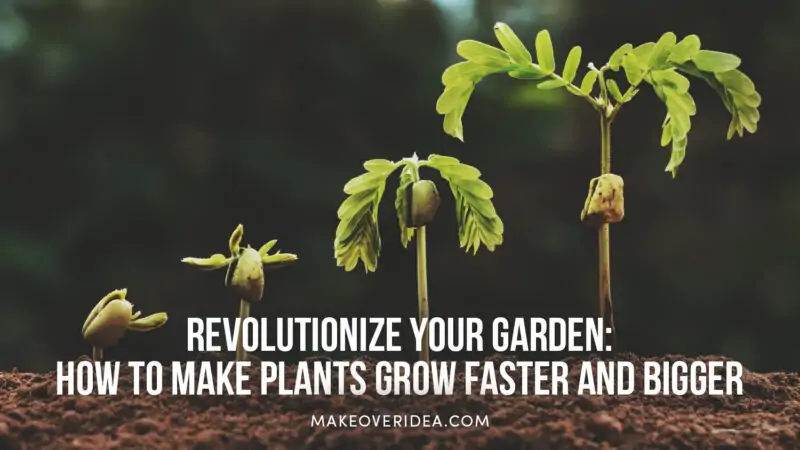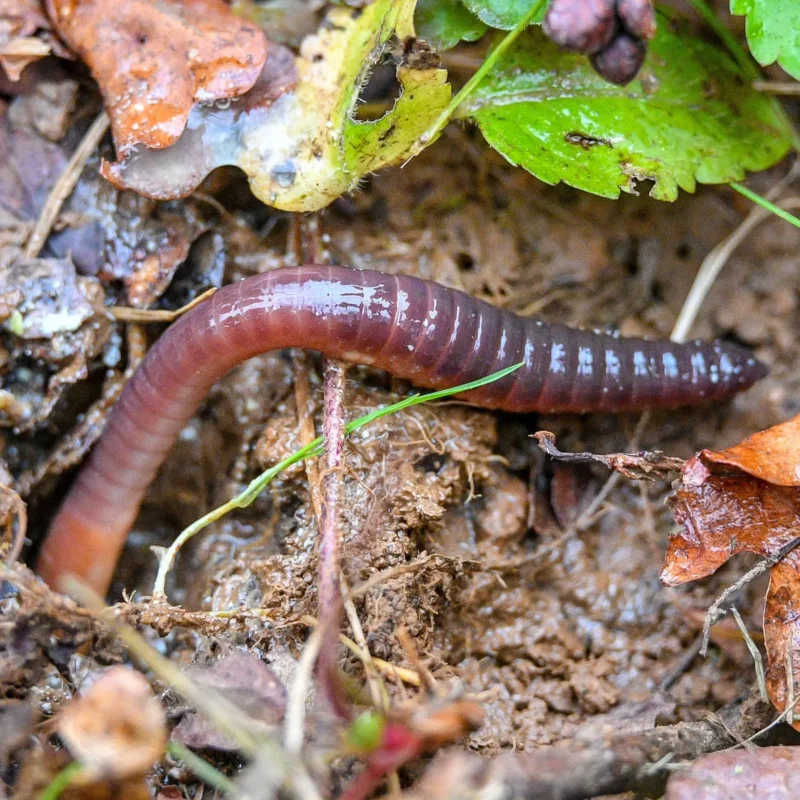The Comprehensive Guide: How to Make Plants Grow Faster

Warning: Undefined property: stdClass::$error in /sites/makeoveridea.com/wp-content/themes/theissue/inc/misc.php on line 71
Warning: Undefined property: stdClass::$error in /sites/makeoveridea.com/wp-content/themes/theissue/inc/misc.php on line 71
Do you dream of having a lush, green garden with beautiful healthy plants? It all boils down to the question of how to make plants grow faster and bigger. In this article, we help you understand the basics of plant growth and providing them with the right nutrients. We will also explore various organic approaches to growing plants faster and how to choose the right fertilizer. We’ll also delve into environmental factors influencing plant growth rates.
Whether you’re an experienced gardener or just starting out, this guide is designed to help your plants thrive. So let’s get started!
Fundamentals of Growing Plants Faster and Bigger
Before we dive into specific ways to make plants grow faster and bigger at home, it’s essential first to understand what makes them tick.
The Role of Essential Nutrients
Plants require three primary macronutrients: nitrogen (N), phosphorus (P), and potassium (K). They need these nutrients in varying amounts depending on their type and stage of development. Nitrogen aids in leafy green production, while phosphorus promotes root development, and potassium strengthens stems.
Secondary macronutrients required for the growth of plants include calcium (Ca), magnesium (Mg), and sulfur (S). While all of them are needed only in smaller quantities, they are still critical for healthy foliage formation and fruit/vegetable production.
Micronutrient requirements like iron (Fe), copper (Cu), zinc (Zn), manganese (Mn), boron (B), chlorine (Cl), nickel (Ni), and molybdenum (Mo) play vital roles in ensuring enzymes can function properly during the photosynthesis process, where sunlight is converted to stored energy by making carbohydrates.
Importance of Soil Quality and Composition
Soil quality plays a crucial role in determining how efficiently roots absorb water from the soil and break down fertilizers introduced through different sources.
It is strongly recommended that you conduct a soil test to find out the pH level of your garden patch. Ideal pH levels range between 6-7, being slightly acidic to neutral in most cases unless specified otherwise based on crop preference. For example, you need to keep your plants like blueberries or rhododendrons in soil with pH levels around 5-6 as they are known for low additional acidity.
Good drainage is essential, as is the ability to retain moisture.
Organic matter content is related to the decomposition of dead plant material (compost) and manure, which provides slow-release nutrients over time to boost plant growth.
Organic Approaches for Faster Plant Growth
Now that you understand what plants need to grow optimally, let’s explore some organic approaches that can help speed up their growth rate.
The Power of Compost Tea
Compost tea, a brewed solution made from steeping compost in water, helps introduce microbes and beneficial bacteria & fungi that play crucial roles in supporting healthy soil microbiology. They break down large insoluble particles into more manageable forms, allowing better nutrient absorption through root systems and promoting faster growth rates with less stress on plants.
A simple recipe involves filling a cloth bag or stocking it with compost from your compost pile and letting it soak in water overnight. Dilute this mixture at a 1:5 ratio to ensure that your plants are not at risk of being burned. Remember, plants require nutrients in moderate amounts, and more doesn’t mean better. Apply directly around roots or as a foliar spray to ensure maximum availability during suitable periods, like the early morning before the sun gets too hot.
Benefits of Banana Peels, Eggshells, and Used Tea Leaves
Banana peels contain high amounts of potassium, phosphorus, calcium, and other micronutrients, which break down slowly over time, providing a steady nutrient supply source. Eggshells add calcium, magnesium, zinc, iron, and, most importantly, nitrogen, an element required for leafy green production. Used tea leaves contain all important micronutrients and can be used for your indoor plants.
To utilize banana peels, simply cut them into smaller pieces and bury them near roots or place them atop the soil surface, then cover lightly, ensuring they are getting adequate direct sunlight exposure (keep in mind that there are certain plants that thrive when exposed to indirect sunlight only, and grow lights are sometimes a very good choice). Wait a few weeks until decomposition occurs before adding another layer so all nutrients get absorbed properly.
Crush eggshells finely and sprinkle them around the base of the stem, improving structure and drainage capabilities while aiding in pest control due to their sharp edges, which make it harder for insect pests to climb onto the stem. This way you will avoid damage caused by microbial activity and rotting stems that kill off important plant tissues.
How Worms Contribute to Accelerated Growth
Worm castings, also known as vermicomposting, are waste produced by worms feeding on organic materials. In this way, worms create a nutrient-rich soil amendment ideal for providing nutrients that plants will require for growth.
To make your worm compost, simply put a layer of bedding material such as shredded newspaper, straw, or leaves on the bottom of a bin filled with worms (red wigglers are preferred), then top this off with food scraps from the kitchen, avoiding dairy products and meat that attract pests and slow down the decomposition process. Isn’t it great to find out these secret ingredients to make your garden grow faster?

Choosing the Right Fertilizer for Faster Growth
Fertilizers are an excellent way to allow your plants to grow fast when they need it most, but choosing one can be overwhelming.
Comparing Organic and Chemical Fertilizers
Organic fertilizers, derived from natural sources like manure, bone meal, and fish emulsion, break down over time and contribute slowly to the growth of your plants. Their chemical-based counterparts provide plants with fast and easy-to-use nutrients, so chemical fertilizers work faster, acting instantly upon application. Chemical type of fertilizer contains synthetic ingredients intended for quick release and artificial additives in the form of straight NPK ratios, not always best suited depending on your particular plant requirements.
Chemical fertilizers have the distinct advantage of being easier to apply evenly, requiring less quantity, and usually being more cost-effective compared to organics. However, they risk burning roots and causing damage if applied improperly.
Tailoring Fertilizer to Your Plant’s Needs
It’s important to consider pH levels (acidity/alkalinity) before applying fertilizer, as fertilizers may alter these, making conditions unfavorable for certain crops.
We recommend using homemade concoctions and testing soil prior to additions, readily available through gardening stores or online outlets, ensuring optimal results without risking harm from chemicals present in conventional brands.
Safety direction on the bottle of your liquid fertilizer must never be overlooked since failure to adhere to instructions on packaging could lead to potential health hazards, especially for children and pets living within the vicinity. It is preferable to choose inorganic fertilizers labeled non-toxic and harmless to humans and animals alike.
Environmental Factors Influencing the Health of the Plants
Apart from nutrition and fertilizer quality, other factors influencing plant growth include climate changes, water supply, light exposure, and pest control practices, among others.
Selecting Plants Suitable for Your Climate
Different types of plants thrive based on different climates, often categorized by zones. USDA Hardiness Zones indicate areas where particular varieties of plants will grow well and help select suitable species to fit specific requirements.
Plants require different levels of sunlight; some prefer direct exposure while others do best in shaded areas. Watering frequency varies depending on the environment, soil structure, and composition, so it’s essential to monitor moisture levels to avoid over-watering, drowning roots, and causing damage.
Frequently Asked Questions About Speeding Up Plant Growth
There is no scientific evidence proving music has a significant impact on plant growth rates, but listening to soothing sounds can create a calming atmosphere beneficial for human mental health benefits.
Banana peels, eggshells, coffee grounds, and other organic kitchen waste make excellent fertilizer choices for your indoor and outdoor plants since they provide slow-release nutrients ideal for faster vegetable production, encouraging healthy microbial activity within garden beds and pots alike.
Greenhouses are designed to protect plants from harsh weather conditions, creating an optimal microclimate suitable for different varieties, speeding up their growth rates, and minimizing the chances of pest infestations and diseases common in outdoor gardening environments.
Conclusion
If you want your plants to grow faster, there are many ways you can help them along the way. Understanding what they need to thrive and providing them with proper nutrition is a great place to start.
Organic approaches like compost tea, banana peels, eggshells, and worm castings all contribute to improving fertility without risking harm from chemicals present in conventional brands.
Choosing the right fertilizer tailored to specific needs is a key factor in ensuring success. Consider factors influencing plant growth, including climate changes, water supply, light exposure, and pest control practices, among others, when selecting appropriate species and hardiness zones. Taking into account environmental considerations and balancing watering schedules will help you find the definite answer to the question of how to make plants grow faster!